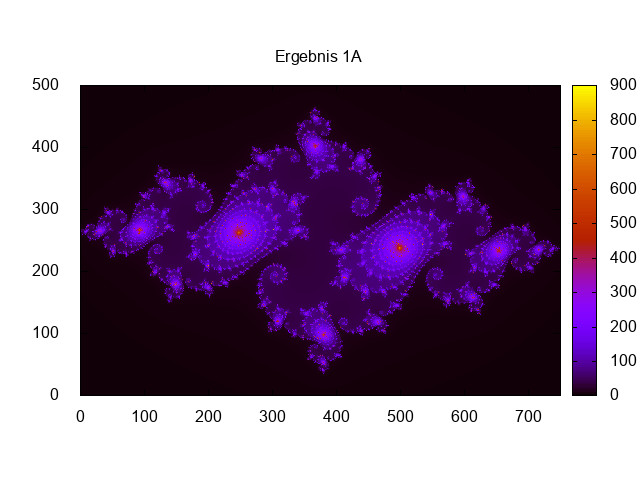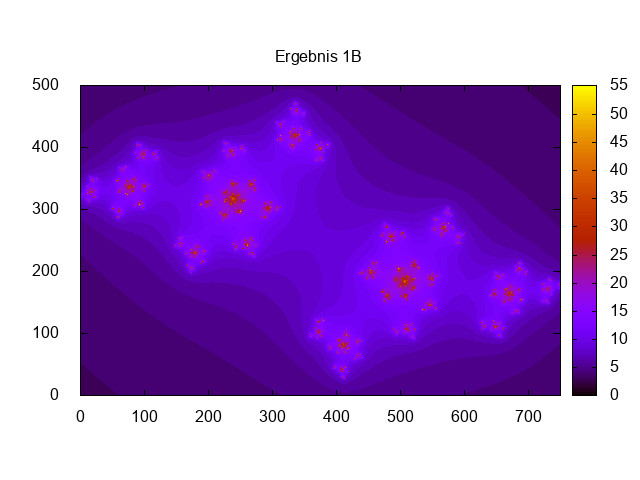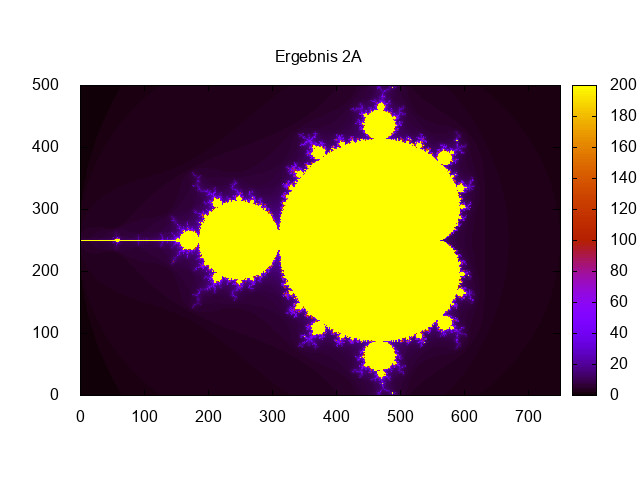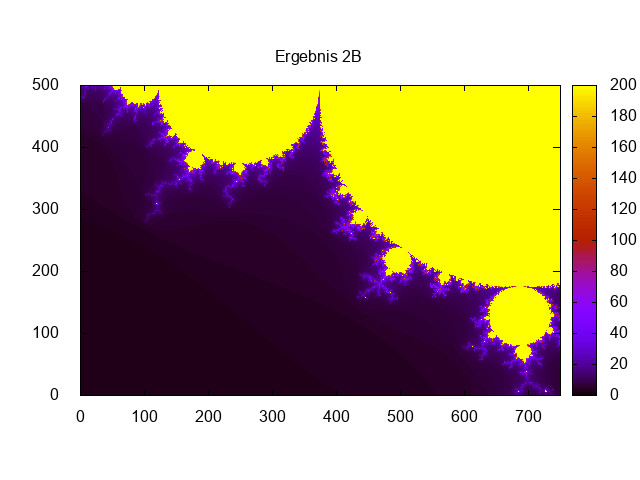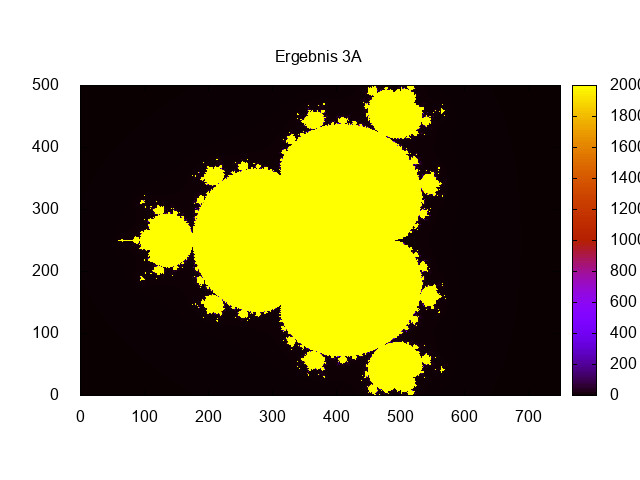Richard Fehler [1839907] und Manuel Wenzel[].
Implementierung einer Klasse komplexer Zahlen in C++ und Visualisierung vom Konvergenzverhalten komplexer Zahlenfolgen.
Source Code:
complex.h
/* complex.h */
#ifndef COMPLEX_H_
#define COMPLEX_H_
#include <cstddef>
class MyComplex { // Beginn der MyComplex Klasse
public:
// Constructor
MyComplex(const double& real, const double& imag);
// Default Constructor
MyComplex();
// Copy-Constructor
MyComplex(const MyComplex& c);
// Destructor
~MyComplex();
// Return real-part of MyComplex
const double real() const;
// Return imag-part of MyComplex
const double imag() const;
// Return norm of MyComplex
const double norm() const;
// Ausgabe aller Einträge
void print(const std::string title = "",
const int w = 8) const; // const int w=8 default Wert für Abstand.
// Übergabe bei Aufruf optional
// Copy Operator
MyComplex& operator=(
const MyComplex& c); //& was ist der Unterschied zwischen MyComplex &
// operator, MyComplex operator
// MyComplex-Addition
const MyComplex operator+(const MyComplex& c2) const;
// MyComplex-Addition
const MyComplex operator+(const double& skal) const;
// MyComplex-Subtraktion
const MyComplex operator-(const MyComplex& c2) const;
const MyComplex operator-() const;
// Multiplikation mit Complex
const MyComplex operator*(const MyComplex& c2) const;
// Multiplikation mit Skalar
const MyComplex operator*(const double& lambda) const;
private:
double* dataPtr; // pointer for data
}; // Ende der Vector Kasse
#endif
complex.cpp
/* complex.cpp */
#include <cassert>
#include <cmath>
#include <cstddef>
#include <cstdlib>
#include <iomanip>
#include <iostream>
#include "complex.h"
using namespace std;
// Constructor
MyComplex::MyComplex(const double& real, const double& imag) {
this->dataPtr = new double[2];
this->dataPtr[0] = real;
this->dataPtr[1] = imag;
};
MyComplex::MyComplex() { this->dataPtr = new double[2]; };
// Copy-Constructor
MyComplex::MyComplex(const MyComplex& c) {
this->dataPtr[0] = c.dataPtr[0];
this->dataPtr[1] = c.dataPtr[1];
};
// Destructor
MyComplex::~MyComplex() { delete[] this->dataPtr; };
// Return real-part of MyComplex
const double MyComplex::real() const { return this->dataPtr[0]; };
// Return imag-part of MyComplex
const double MyComplex::imag() const { return this->dataPtr[1]; };
// Return norm of MyComplex
const double MyComplex::norm() const {
return (sqrt((this->dataPtr[0] * this->dataPtr[0]) +
(this->dataPtr[1] * this->dataPtr[1])));
};
// Copy Operator
MyComplex& MyComplex::operator=(const MyComplex& c) {
delete[] this->dataPtr;
// try to allocate memory and catch an exception
this->dataPtr = new double[2];
// do the copying
this->dataPtr[0] = c.dataPtr[0];
this->dataPtr[1] = c.dataPtr[1];
return *this; //*this warum *
};
// MyComplex-Addition
const MyComplex MyComplex::operator+(const MyComplex& c2) const {
const MyComplex tmp;
for (std::size_t m = 0; m < 2; m++)
tmp.dataPtr[m] = this->dataPtr[m] + c2.dataPtr[m];
return tmp;
};
const MyComplex MyComplex::operator+(const double& skal) const {
const MyComplex tmp;
tmp.dataPtr[0] = this->dataPtr[0] + skal;
tmp.dataPtr[1] = this->dataPtr[1];
return tmp;
};
// MyComplex-Substraktion
const MyComplex MyComplex::operator-(const MyComplex& c2) const {
const MyComplex tmp;
for (std::size_t m = 0; m < 2; m++)
tmp.dataPtr[m] = this->dataPtr[m] - c2.dataPtr[m];
return tmp;
};
// MyComplex-Unäres
const MyComplex MyComplex::operator-() const {
const MyComplex tmp;
for (std::size_t m = 0; m < 2; m++) tmp.dataPtr[m] = -(this->dataPtr[m]);
return tmp;
};
// Multiplikation mit Skalar
const MyComplex MyComplex::operator*(const double& lambda) const {
const MyComplex tmp;
tmp.dataPtr[0] = lambda * this->dataPtr[0];
tmp.dataPtr[1] = lambda * this->dataPtr[1];
return tmp;
};
// Skalarprodukt
const MyComplex MyComplex::operator*(const MyComplex& c2) const {
const MyComplex tmp;
tmp.dataPtr[0] =
(this->dataPtr[0] * c2.dataPtr[0]) - (this->dataPtr[1] * c2.dataPtr[1]);
tmp.dataPtr[1] =
(this->dataPtr[0] * c2.dataPtr[1]) + (this->dataPtr[1] * c2.dataPtr[0]);
return tmp;
};
maincomplexbeispiel.cpp
#include <iostream>
#include <string>
// header file for own complex number class
#include "complex.h"
using namespace std;
void output_my_cplx(const MyComplex &c, const std::string txt) {
cout << txt << ": (" << c.real() << ", " << c.imag() << ")" << endl;
}
int main() {
MyComplex z1{2., 7.};
MyComplex z2{42., -9};
MyComplex z3{-11., 19.};
MyComplex z4, z5, z6, z7, z8, z9;
output_my_cplx(z1, "z1 ");
output_my_cplx(z2, "z2 ");
output_my_cplx(z3, "z3 ");
z4 = z1 * z2;
output_my_cplx(z4, "z4=z1*z2 =");
z5 = (z1 + z2);
output_my_cplx(z5, "z5=(z1+z2) =");
z6 = (z1 + z2) * 2.;
output_my_cplx(z6, "z6=(z1+z2)*2. = ");
z7 = (z2 + z3) * z1;
output_my_cplx(z7, "z7=(z2+z3)*z1 = ");
z8 = z1 + 5.;
output_my_cplx(z8, "z8=z1+5. = ");
z9 = -z1 + z2;
output_my_cplx(z9, "z9=-z1+z2 = ");
return 0;
}
operator Schreibweise
#include <iostream>
#include <string>
// header file for own complex number class
#include "complex.h"
using namespace std;
void output_my_cplx(const MyComplex &c, const std::string txt) {
cout << txt << ": (" << c.real() << ", " << c.imag() << ")" << endl;
}
int main() {
MyComplex z1{2., 7.};
MyComplex z2{42., -9};
MyComplex z3{-11., 19.};
MyComplex z4, z5, z6, z7, z8, z9;
output_my_cplx(z1, "z1 ");
output_my_cplx(z2, "z2 ");
output_my_cplx(z3, "z3 ");
z4.operator=(z1.operator*(z2));
output_my_cplx(z4, "z4=z1*z2 =");
z5.operator=(z1.operator+(z2));
output_my_cplx(z5, "z5=(z1+z2) =");
z6.operator=((z1.operator+(z2)).operator*(2.));
output_my_cplx(z6, "z6=(z1+z2)*2. = ");
z7.operator=((z2.operator+(z3)).operator*(z1));
output_my_cplx(z7, "z7=(z2+z3)*z1 = ");
z8.operator=(z1.operator+(5.));
output_my_cplx(z8, "z8=z1+5. = ");
z9.operator=((z1.operator-()).operator+(z2));
output_my_cplx(z9, "z9=-z1+z2 = ");
return 0;
}
konvergence.cpp
#include <cmath>
#include <fstream>
#include <iostream>
#include <string>
// header file for own complex number class
#include "complex.h"
using namespace std;
int main() {
// Variablen
MyComplex z0, z1, c0, z_ll, z_ur;
double x0, y0, x_m, y_m, delta_x, delta_y, tmp[2];
int nr_iter, n_x_max, n_y_max, n_exp, n_max_iter, r_conv;
string filename;
// Variablen einlesen
//"nr_inter";
cin >> nr_iter;
//"Wertebereich";
cin >> x0 >> y0 >> x_m >> y_m;
//"Unterteilung";
cin >> n_x_max >> n_y_max;
//"exponent";
cin >> n_exp;
//"Iterationsschritte";
cin >> n_max_iter;
//"Konvergenzradius";
cin >> r_conv;
//"Dateiname";
cin >> filename;
//"Komplexe Konstante";
cin >> tmp[0] >> tmp[1];
// ofstream für Ausgabedatei vorbereiten
ofstream dateiout(filename);
// Berechnung delta_x und delta_y
delta_x = (x_m - x0) / n_x_max;
delta_y = (y_m - y0) / n_y_max;
// 2 for-Schleifen, die Intervalle durchlaufen
for (size_t i = 0; i < n_x_max; i++) {
for (size_t j = 0; j < n_y_max; j++) {
// z0 und c0 für die verschiedenen Teilaufgaben und Startwerte
switch (nr_iter) {
case 1:
z0 = MyComplex(x0 + i * delta_x, y0 + j * delta_y);
c0 = MyComplex(tmp[0], tmp[1]);
break;
case 2:
c0 = MyComplex(x0 + i * delta_x, y0 + j * delta_y);
z0 = MyComplex(tmp[0], tmp[1]);
break;
case 3:
c0 = MyComplex(x0 + i * delta_x, y0 + j * delta_y);
z0 = MyComplex(tmp[0], tmp[1]);
break;
default:
cout << "error";
break;
}
// Variable die Iterationsschritte zählt
int i_iter = 0;
// while-Schleife die erst endet, wenn Konvergenzradius oder maximale
// Iterationen erreicht
while (z0.norm() < r_conv && i_iter < n_max_iter) {
z1 = z0; // Startwert z0 zuweisen
// in for wird Potenz berechnet
for (size_t p = 1; p < n_exp; p++) {
z1 = z1 * z0;
}
z1 = z1 + c0; // c0 dazu addieren
z0 = z1; // z1 ist nun der neue Wert von z0
i_iter++;
}
// Ausgabedatei schreiben
dateiout << i << " " << j << " " << i_iter << endl;
}
}
cout << filename << "berechnet! " << endl;
return 0;
}
Building
./makefile ./buildkonv.sh
Ausfuehren der Berechnung
Skript:
#!/usr/bin/env bash
echo 'starte Berechnung'
./konvergence<start1A.dat
echo '1A berechnet'
./konvergence<start1B.dat
echo '1B berechnet'
./konvergence<start2A.dat
echo '2A berechnet'
./konvergence<start2B.dat
echo '2B berechnet'
./konvergence<start3A.dat
echo '3A berechnet'
Plots
Skript
#!/usr/bin/env gnuplot
set xrange [0:750]
set yrange [0:500]
set pm3d map
set term jpeg
print" plotting"
set output "Ergebnis1A.jpeg"
set title "Ergebnis 1A"
spl './ergebnis1A.dat' u 1:2:3 with image
print "Ergebnis 1A"
unset output
unset title
set output "Ergebnis1B.jpeg"
set title "Ergebnis 1B"
spl 'ergebnis1B.dat' u 1:2:3 with image
print "Ergebnis 1B"
unset output
unset title
set output "Ergebnis2A.jpeg"
set title "Ergebnis 2A"
spl 'ergebnis2A.dat' u 1:2:3 with image
print "Ergebnis 2A"
unset output
unset title
set output "Ergebnis2B.jpeg"
set title "Ergebnis 2B"
spl 'ergebnis2B.dat' u 1:2:3 with image
print "Ergebnis 2B"
unset output
unset title
set output "Ergebnis3A.jpeg"
set title "Ergebnis 3A"
spl 'ergebnis3A.dat' u 1:2:3 with image
print "Ergebnis 3A"
unset output
unset title
